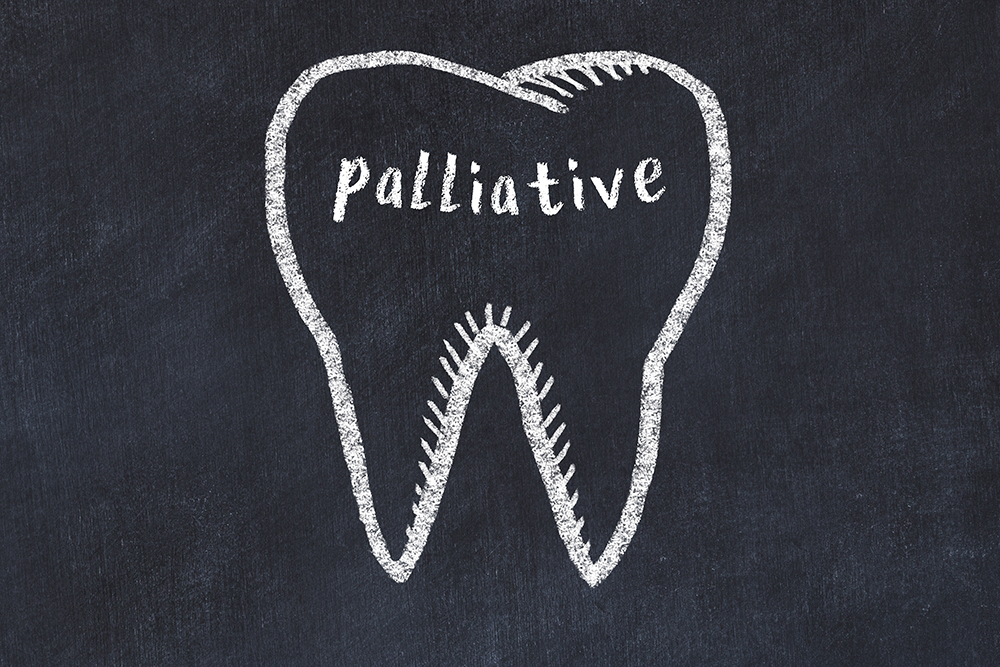Patients with serious illnesses can receive specialised treatment called palliative care. The objective of palliative care is to help enhance patients’ and their families’ quality of life. It focuses on providing relief from symptoms and the stress of illness. And since palliative care concerns medical, mental and spiritual issues, it is a very multidisciplinary approach.¹
One might ask the question: ‘How is oral care related to palliative care?’ The treatments palliative patients undergo, the medications they take and the disease itself, often lead to oral-related side effects. Therefore, the understanding is that the general health of people who are terminally ill may benefit significantly from palliative care, paired with the principles of dentistry. These patients are more likely to experience oral issues that could result in oral dysfunction. This dysfunction could contribute to avoidable pain and discomfort and lower their quality of life. All patients should, therefore, receive routine oral treatment on a daily basis.²


Unfortunately, however, the role of oral care is often neglected in palliative care. But this doesn’t change how important it is to provide constant oral care to these patients. In fact, early detection and treatment of oral conditions in palliative patients has been found to help decrease pain and suffering. Furthermore, it can help prevent the worsening of oral care-related conditions.
What oral care-related complications could palliative care patients face?
Scientific reviews have concluded that the most common oral conditions amongst palliative patients include:³
- Xerostomia – This is a dry mouth syndrome that is common in patients receiving radiotherapy to their head and/or neck. Additionally, the palliative medicines used in palliative care contribute to the development of dry mouth.¹
- Oral candidiasis – It is a yeast infection in the mouth. Bad oral hygiene, hyposalivation, medications,⁴ a weakened immune system and inadequate nourishment, are risk factors for developing oral candidiasis.¹
- Dysphagia – This refers to a decrease in salivary secretion, which results in having difficulty swallowing. Dysphagia contributes to the deterioration of the patient’s oral health and, in some cases, can lead to aspiration pneumonia. You can read more about dysphagia management in a previous blog article.
- Oral mucositis – This is a painful inflammatory condition that occurs in patients undergoing chemotherapy and radiotherapy.¹ It can lead to ulceration and orofacial pain. This painful situation can severely disrupt oral intake.
How can effective oral care help improve the lives of palliative patients?
As there are many problems that could occur in palliative care patients, oral care is an important tool to help enhance their quality of life. Oral care should be considered one of the basic nursing activities. It is, therefore, important to regularly assess and monitor the mouths of patients. Another important point is to assess whether each patient is able to perform their own oral care or requires assistance. The goal is to deliver convenient treatment to help provide relief, minimise pain and prevent further complications as best as possible.
Furthermore, oral care is not only important for physical well-being, but also for psychological well-being. Oral care in the palliative care setting can help improve the overall psychological well-being of patients, their families and caregivers. This includes reducing anxiety and depression, increasing the sense of self-worth and promoting comfort and dignity in end-of-life patients.
Oral care treatments include:
- Brushing regularly to achieve healthy teeth
- Removing plaque build-up with mechanical movements
- Collecting excess salivary secretions
- Keeping the mouth and gums moisturised
- Brushing and cleaning dentures.
Medline can help you establish an oral care protocol in your facility’s palliative care regimen. We have several oral care solutions that can support oral care needs, helping you to improve clinical outcomes. Explore the range of items on our oral care page. These include:
If a strong oral care regimen isn’t already included in your palliative care delivery, and in a comprehensive way, consider changing this today for the benefit of your patients!


Zeynep Ergeneci
Product Manager ReadyCare, Personal Care, Advanced Wound Care and Repositioning & Offloading, Medline Europe
Zeynep, originally from Turkey, came to the Netherlands in 2020 to complete her Master of Science in Economics. She graduated in 2021 and completed an internship in sales analysis. After that, she joined Medline Europe and is currently managing Medline’s urology and ReadyCare portfolios. Zeynep has a passion for travelling, exploring new cultures and really enjoys nature. Learn more on Linkedin.
References:
[1] Kvalheim, S., & Strand, G. V. (2022). A Narrative of Oral Care in Palliative Patients. International Journal of Environmental Research and Public Health, 19(10), 6306. https://doi.org/10.3390/ijerph19106306
[2] Mouth care at the end of life | Information for professionals. (2021, January 29). Marie Curie. https://www.mariecurie.org.uk/professionals/palliative-care-knowledge-zone/symptom-control/mouth-care
[3] Venkatasalu, M. R., Murang, Z. R., Ramasamy, D. T. R., & Dhaliwal, J. S. (2020). Oral health problems among palliative and terminally ill patients: an integrated systematic review. BMC Oral Health, 20(1). https://doi.org/10.1186/s12903-020-01075-w
[4] Sen, S., Priyadarshini, S. R., Sahoo, P. K., Dutta, A., Singh, A., & Kumar, U. (2020). Palliative oral care in patients undergoing radiotherapy: Integrated review. Journal of Family Medicine and Primary Care, 9(10), 5127. https://doi.org/10.4103/jfmpc.jfmpc_827_20















